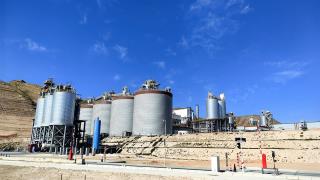Open-gear drives of kilns and ball mills are often exposed to harsh operating conditions. While considerable advances have been made in terms of the design and manufacture of drives, tooth flank damage remains an issue due to excessive wear or material fatigue. Correct lubricant selection and application play a vital role in addressing the problem. By Werner Gschwandtner and Hermann Siebert, Klüber Lubrication Austria GmbH, Austria.
To ensure the continuous operation of a cement plant, the reliability of girth gear drives is of great importance to the operation of rotary kilns and ball mills. Therefore, they represent a key component of maintenance in terms of monitoring and service. However, girth gears are exposed to a wide range of operating conditions such as varying loads, variable speeds, temperatures and dust.
In addition, the pinion and the girth gear have to be aligned during assembly. Consequently their axes are often not parallel, making operating conditions even more demanding. This often leads to high area loads resulting in excessive wear and other tooth flank damage. Further contributing factors can be inadequate foundations or insufficiently sealed girth gear covers allowing dust ingress.
